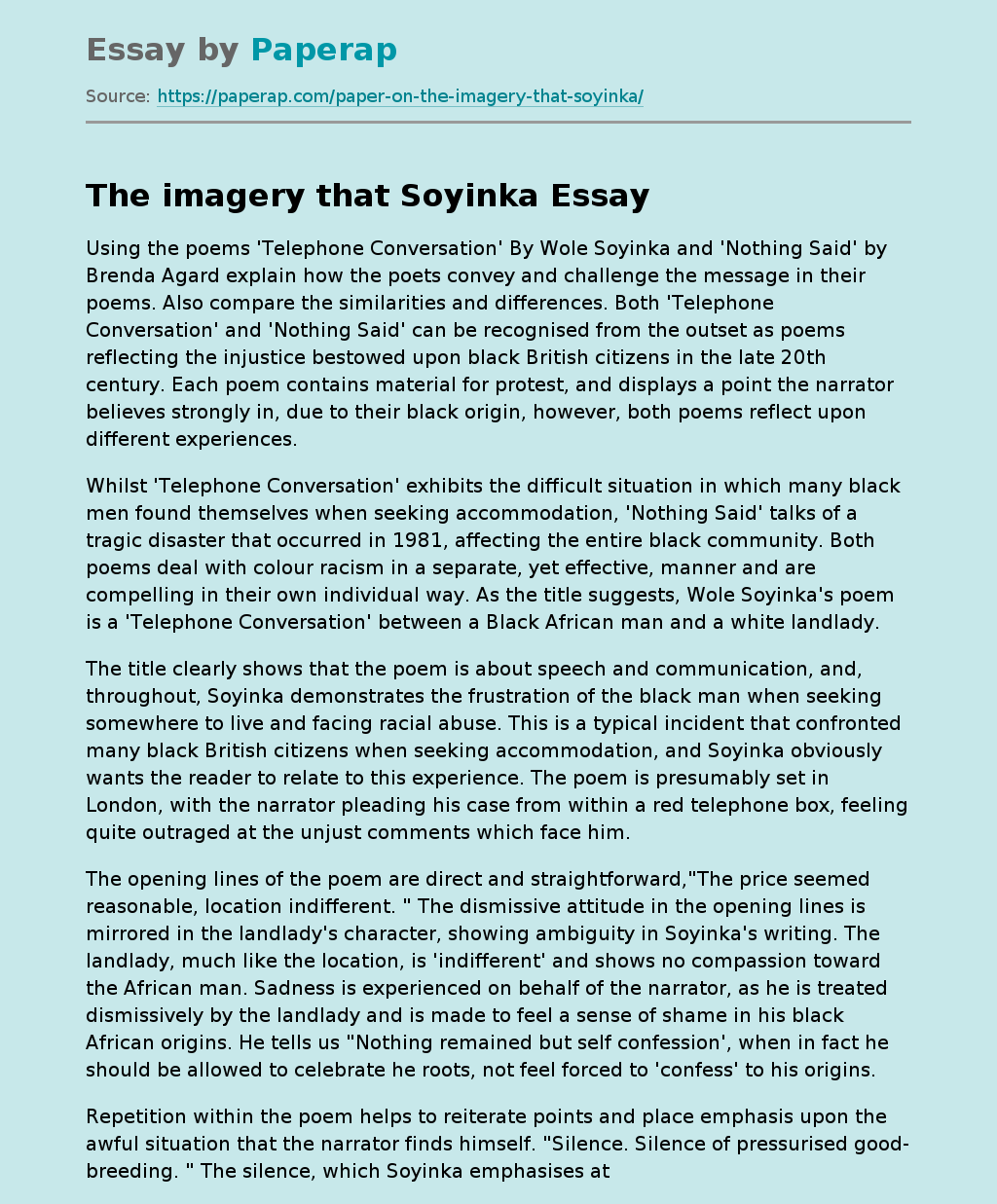The imagery that Soyinka
Using the poems ‘Telephone Conversation’ By Wole Soyinka and ‘Nothing Said’ by Brenda Agard explain how the poets convey and challenge the message in their poems. Also compare the similarities and differences. Both ‘Telephone Conversation’ and ‘Nothing Said’ can be recognised from the outset as poems reflecting the injustice bestowed upon black British citizens in the late 20th century. Each poem contains material for protest, and displays a point the narrator believes strongly in, due to their black origin, however, both poems reflect upon different experiences.
Whilst ‘Telephone Conversation’ exhibits the difficult situation in which many black men found themselves when seeking accommodation, ‘Nothing Said’ talks of a tragic disaster that occurred in 1981, affecting the entire black community. Both poems deal with colour racism in a separate, yet effective, manner and are compelling in their own individual way. As the title suggests, Wole Soyinka’s poem is a ‘Telephone Conversation’ between a Black African man and a white landlady.
The title clearly shows that the poem is about speech and communication, and, throughout, Soyinka demonstrates the frustration of the black man when seeking somewhere to live and facing racial abuse.
This is a typical incident that confronted many black British citizens when seeking accommodation, and Soyinka obviously wants the reader to relate to this experience. The poem is presumably set in London, with the narrator pleading his case from within a red telephone box, feeling quite outraged at the unjust comments which face him.
The opening lines of the poem are direct and straightforward,”The price seemed reasonable, location indifferent.
” The dismissive attitude in the opening lines is mirrored in the landlady’s character, showing ambiguity in Soyinka’s writing. The landlady, much like the location, is ‘indifferent’ and shows no compassion toward the African man. Sadness is experienced on behalf of the narrator, as he is treated dismissively by the landlady and is made to feel a sense of shame in his black African origins. He tells us “Nothing remained but self confession’, when in fact he should be allowed to celebrate he roots, not feel forced to ‘confess’ to his origins.
Repetition within the poem helps to reiterate points and place emphasis upon the awful situation that the narrator finds himself. “Silence. Silence of pressurised good-breeding. ” The silence, which Soyinka emphasises at this point, is that of the landlady, as she coldly accepts the information that her proposed tenant is black. Her silence allows the reader to sympathise with the black narrator’s awkward situation, and creates a negative image of the landlady. Her ‘pressurized good-breeding’ shows that she is struggling to be polite due to the pressure and shock upon hearing the African man’s news.
“Madam I hate a wasted journey-I am African. ” The imagery that Soyinka uses to describe the landlady allows the reader to envisage her through the black man’s mind. He describes her as “Lipstick coated, long gold-rolled cigarette-holder pipped” This shows that he imagines her to be upper class and glamorous: a stereotypical image, displaying prejudice. This is perhaps a point that Wole Soyinka is inadvertently trying to demonstrate within “Telephone Conversation”; that prejudice is becoming more predominant within modern society.
Soyinka uses capital letters to emphasise the landlady’s questions, “ARE YOU LIGHT? OR VERY DARK? ” and the use of ellipses helps heighten the feeling of disgust at the landlady’s rude and arrogant nature, by accentuating her pauses. The narrator is depicted as incredulous, and the comment ‘I had not misheard’ reflects the reader’s own thoughts of astonishment at this appalling display of racism. The shock of the narrator is exhibited throughout the following sentences with Soyinka commenting on the surroundings, describing the buttons on the payphone as if contemplating ending the call.
“Button B. Button A. ” A clever play on words compares the conversation to the childhood game ‘hide and seek’, “Stench of rancid breath of public hide-and-speak. ” Perhaps this reference to childhood refers to the immaturity and insensitivity of the landlady, which the black African would have hoped he would no longer encounter in adult life. The confused narrator observes his surrounding, with Wole Soyinka using repetition again to portray his bewilderment. “Red booth. Red pillar-box. Red double-tiered omnibus squelching tar. ”
Finally a realisation hits the black African, ‘It was real! ” This short sharp sentence captures the narrator’s disbelief over the previous lines as he is hit with reality, causing the reader to pity the hopeless situation he is now left in. The narrator becomes aware of how rude he is being by leaving the landlady’s question unanswered, showing his good manners in comparison to her rudeness and ignorance. The landlady once again questions the black African, this time sarcastically described as ‘considerate’, whilst her racist and insensitive attitude remains the same.
The imagery that Soyinka. (2017, Oct 22). Retrieved from https://paperap.com/paper-on-the-imagery-that-soyinka/

